


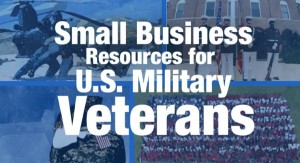
Hammock’s SmallBusiness.com features a guide to resources for U.S. military veteran-owned small businesses. (Click on image to visit the guide.)
Ninety-seven years ago, on the 11th hour of the 11th day of the 11th month of 1918, “The War to End All Wars” came to a halt as the Allied powers and Germany declared an armistice—a break in the fighting. From 1919 to 1953, that day was celebrated as Armistice Day. In 1954, following the horrors of another World War and the bitter truce in Korea, Congress voted to change the name to Veterans Day to honor all who had served—and would serve—in our nation’s Armed Services.
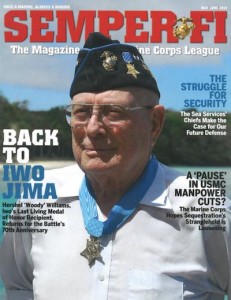
The May-June Semper Fi magazine highlighted the last-surviving Medal of Honor recipient from the battle of Iwo Jima.
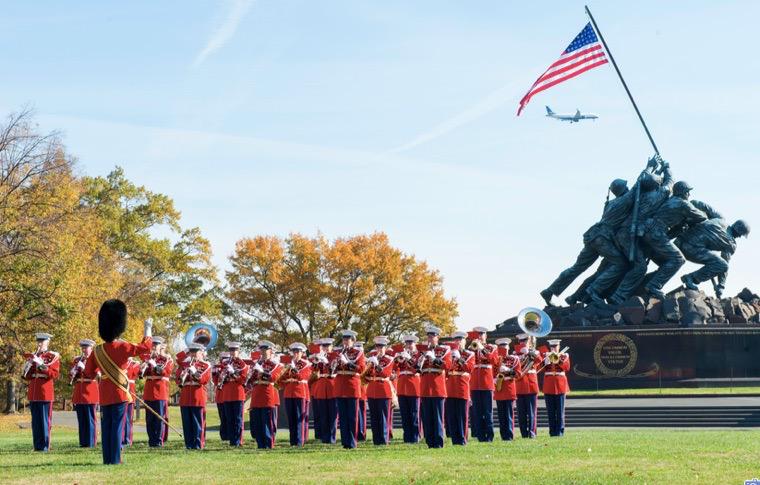
Maybe we’re biased because we work with the Marine Corps League on its magazine, Semper Fi, but for our money nobody plays “The Star-Spangled Banner” better than a Marine Corps band. Though there are a number of bands at Marine Corps installations, “The President’s Own” is the original, tracing its roots to 1798 when it was founded by an of Congress. Dubbed “The President’s Own” by Thomas Jefferson, The Marine Band is America’s oldest continuously active professional musical organization, and is celebrated for its White House performances and hundreds of annual public concerts.
It was The Marine Band that first played the tune of “The Star-Spangled Banner” at the White House during a reception given by President Thomas Jefferson on July 4, 1806. At that time the tune was called “To Anacreon in Heaven,” and was the official drinking and feasting song of an amateur musicians’ club in London called the Anacreontic Society. A guest at the reception later recalled “an exquisite band of music [that] played at intervals martial, patriotic, and enlivening airs, which reverberated through the spacious dome.”
Some eight years later, Francis Scott Key wrote new words for the tune after witnessing Fort McHenry, Maryland, withstand a bombardment by the British Navy during the War of 1812. The new song became a popular, if challenging, patriotic song in the 19th century, though it was not made the national anthem until 1931.
We at Hammock join with you in celebrating our independence and thanking all the men and women who have laid their lives on the line to defend it since 1776. And we can’t think of a better way to kick off your celebration than by playing “The Star-Spangled Banner” as performed by “The President’s Own.”:
We’ll hear “The Star-Spangled Banner” played a number of times over the next few days, and no doubt, we’ll think of fireworks when we hear “the rockets’ red glare/the bombs bursting in air.”
But, as we explain in the July/August issue of American Spirit, which Hammock publishes with the Daughters of the American Revolution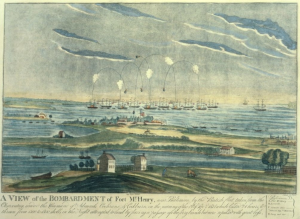 , the rockets that Francis Scott Key immortalized weren’t playthings. They were a British system of military rocketry that largely failed to carry out its mission against Fort McHenry, the fort that defended Baltimore Harbor during the War of 1812.
, the rockets that Francis Scott Key immortalized weren’t playthings. They were a British system of military rocketry that largely failed to carry out its mission against Fort McHenry, the fort that defended Baltimore Harbor during the War of 1812.
Designed by the English inventor Sir William Congreve and modeled on rockets used against the British in India by Indian troops, the rockets that flew over Fort McHenry weighed about 32 pounds and had two major deficiencies—they were unreliable, inaccurate and also tended to explode prematurely.
The rockets fired on September 13, 1814, were launched from the British ship Erebus, and ultimately did little physical damage, though the screaming, wildly gyrating rockets terrified American defenders.
Congreve’s rockets consisted of an iron tube packed with propellant and a conical warhead, with three interchangeable payloads including incendiary devices, explosives and case shot—anti-personnel devices that exploded and sprayed iron balls in a lethal cloud. They ranged in size from 3 to about 32 pounds, and could be fired from ships as well as by troops on the ground.
 Hammock Inc.’s work for clients has earned six Apex Awards, including a coveted Grand Award, in the just-concluded competition.
Hammock Inc.’s work for clients has earned six Apex Awards, including a coveted Grand Award, in the just-concluded competition.
The Grand Award went to American Spirit, the bimonthly member magazine of the National Society Daughters of the American Revolution, which we have published for DAR since 2002, and which has taken a number of Grand Awards.
The competition’s judges lavished praise on the November-December 2013 issue of American Spirit, saying that, “This is a magazine that never fails to appeal. The design and layout are richly stunning, but the editorial well is the tour de force here. Features are thoroughly researched and presented in a lively and engaging manner. You find yourself reading each to the end, even when the topic is one you didn’t think would particularly interest you. Top drawer in every respect.”
Apex Awards of Excellence were accorded to:
 Hammock Inc.’s eponymous head-helper, Rex Hammock, is among the 12 “media and publishing” Nashvillians included in the 450 top business, political and civic leaders honored in the Nashville Post’s 5th annual “In Charge” list. This is the second consecutive year the list has included Rex, the eponymous.
Hammock Inc.’s eponymous head-helper, Rex Hammock, is among the 12 “media and publishing” Nashvillians included in the 450 top business, political and civic leaders honored in the Nashville Post’s 5th annual “In Charge” list. This is the second consecutive year the list has included Rex, the eponymous.
The Post post notes that Rex was “a trailblazer in blogging (he was the first person to blog a meeting with a president, in 2004) and social media (his Twitter handle is @R)” – which gives you an idea of how closely he follows developments in social and other kinds of media.
Rex founded Hammock in 1991 as a specialized marketing services company creating media that companies and organizations use to communicate directly with their customers or members. He also helped to found the national trade association, the Custom Content Council, of which Hammock Inc. is a founding member.
(And if you’re wondering what that photo is all about, it accompanied a story on the Google Enterprise blog when we were an early-adopter of Google Apps for Business.)

Though we’re not going to dress up in fancy ballgowns or tuxes with Stetsons and hand-tooled boots like the folks at the CMA awards this week here in Nashville, we at Hammock are celebrating with our clients over a clutch of MarCom awards for the work we are honored to collaborate with our clients in creating.
The MarCom Awards is an international creative competition for anyone involved in the concept, writing and design of print, visual, audio and web materials and programs. The program is administered by AMCP, the Association of Marketing & Communication Professionals. There were about 6,000 entries this year from individuals to media conglomerates and Fortune 50 companies.
Here’s what was in the envelopes:
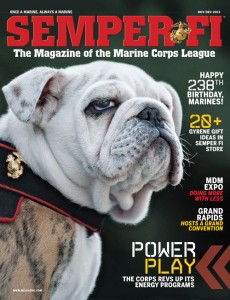 Every U.S. Marine has three birthdays—their first, the day they earned the Eagle, Globe and Anchor, and the birthday of their beloved Corps on 10 November. And the November/December 2013 issue of Semper Fi, the Magazine of the Marine Corps League, sends a birthday greeting to all Devil Dogs, with this cover photo of Lance Corporal Chesty XIV, the USMC’s official mascot.
Every U.S. Marine has three birthdays—their first, the day they earned the Eagle, Globe and Anchor, and the birthday of their beloved Corps on 10 November. And the November/December 2013 issue of Semper Fi, the Magazine of the Marine Corps League, sends a birthday greeting to all Devil Dogs, with this cover photo of Lance Corporal Chesty XIV, the USMC’s official mascot.
The issue also contains birthday greetings from General James F. Amos, the 35th Commandant of the Marine Corps.
Marines have always had a reputation of traveling fast and light, and in the 21st century, the Corps is working hard to reduce its needs for energy, water and resupply. In “Power Play,” contributor Otto Kreisher looks at ways Marines are increasingly using solar energy and local resources to remain in the field longer without resupply. It’s a life-saving as well as environmental concern, since supply lines can be cut, and lives are at risk convoying necessities like fuel and water to forward deployed Marines.
 Along with “Semper Fidelis,” “Devil Dog” and “OORAH,” one of the U.S. Marine Corps’ traditional mantras has been “improvise, adapt and overcome.” The Marines have prided themselves on being the tip of America’s spear, which means hitting first, hitting fast and encountering the unexpected and unplanned for. Tough to do, but an unbroken string of successful amphibious assaults going back to the Revolutionary War speaks for their ability to make do.
Along with “Semper Fidelis,” “Devil Dog” and “OORAH,” one of the U.S. Marine Corps’ traditional mantras has been “improvise, adapt and overcome.” The Marines have prided themselves on being the tip of America’s spear, which means hitting first, hitting fast and encountering the unexpected and unplanned for. Tough to do, but an unbroken string of successful amphibious assaults going back to the Revolutionary War speaks for their ability to make do.
Their talents are being tested again as deep funding cuts triggered by sequestration force the Marines, and the rest of the Department of Defense, to delay, scale back and scrap equipment updates, training programs and other operational necessities.
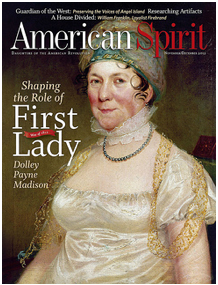 Here at Hammock we tend to subscribe to Natalie Portman’s philosophy that, “Awards are so unnecessary because [we] think we get so much out of our work just by doing it. The work is a reward in itself.” But that’s never stopped us from entering competitions or spreading the news of our success when we receive an award.
Here at Hammock we tend to subscribe to Natalie Portman’s philosophy that, “Awards are so unnecessary because [we] think we get so much out of our work just by doing it. The work is a reward in itself.” But that’s never stopped us from entering competitions or spreading the news of our success when we receive an award.
We recently learned that work we’ve done for clients received a total of five APEX Awards for Publication Excellence this year, including yet another Grand Award for American Spirit, the member magazine of the National Society Daughters of the American Revolution.
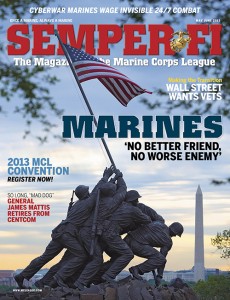 With the ongoing budget problems in Washington, and with America’s presence in Afghanistan winding down, many Marines and other service members will be returning to civilian life and looking for work in the near future. They may be surprised to learn that the values instilled in them during their service are highly desired by the financial services industry.
With the ongoing budget problems in Washington, and with America’s presence in Afghanistan winding down, many Marines and other service members will be returning to civilian life and looking for work in the near future. They may be surprised to learn that the values instilled in them during their service are highly desired by the financial services industry.
In “Psst! Hey Marine! Wall Street Wants … You!” in the July August issue of Semper Fi, the Magazine of the Marine Corps League, several Marine veterans tell how the discipline, commitment, resilience and dedication they learned in the Corps have helped them succeed in a tough, but rewarding business.
We also profile another Marine leaving active duty—General James N. “Mad Dog” Mattis. Outspoken, sometimes controversial but beloved by his Marines (and feared by his enemies), General Mattis had headed U.S. Central Command prior to retirement. He famously told his troops on the eve of Operation Iraqi Freedom to “Demonstrate to the world there is ‘No Better Friend, No Worse Enemy, than a U.S. Marine.'”